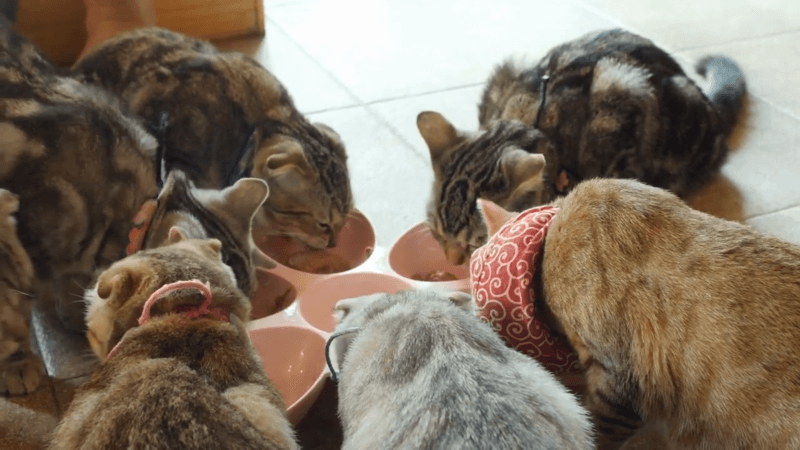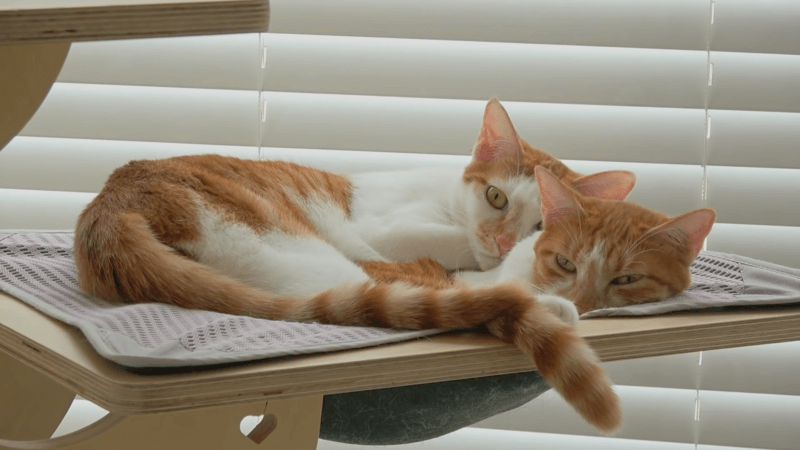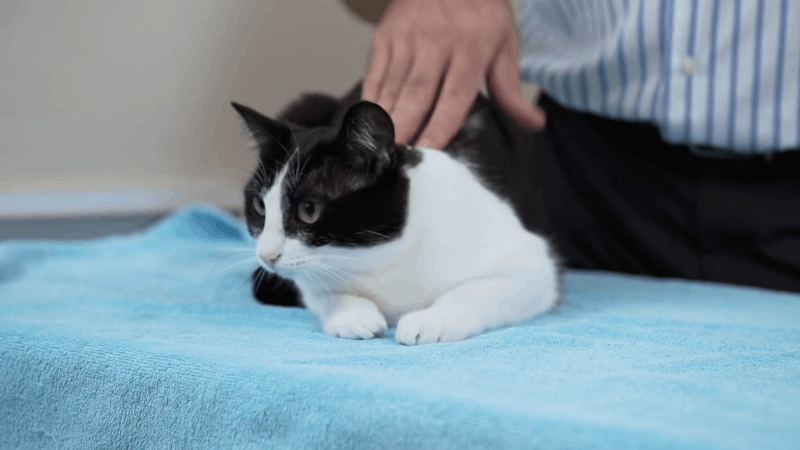No products in the cart.
When it comes to our cats’ stomach health, one of the intriguing questions that often comes to mind is, ‘How long does it take for a cat to digest food?‘ The digestion process in cats, like in humans, is a fascinating and complex journey influenced by various factors. In this blog, we will jump on a journey to explore the factors influencing digestion times, recognize signs of a healthy digestive system, and discover practical ways to support your cat’s well-being.
How Long Does It Take for a Cat to Digest Food?
Well, cats are quite efficient when it comes to digesting their food. On average, it takes about 12 to 16 hours for a cat to fully digest their meal. However, this can vary depending on several factors, such as the cat’s age, the type of food they eat, and their overall health.
Younger cats and kittens tend to have faster digestion rates compared to older cats. Wet cat food is usually processed more quickly than dry kibble because it contains more moisture. But keep in mind that these are just general guidelines, and individual cats may have variations in their digestion times.
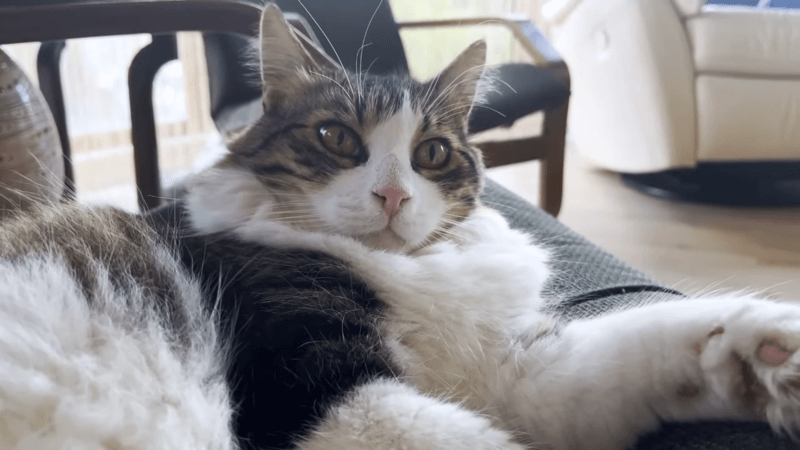
Factors Impacting Digestion Times
Now, let’s talk about the factors that can affect a cat’s digestion time. It’s not a one-size-fits-all situation.
- Age: Kittens tend to digest food faster than adult cats.
- Type of Food: Wet food is often digested more rapidly than dry food due to its higher moisture content.
- Cat’s Health: Cats with digestive issues might experience slower digestion. A healthy gut usually means faster processing.
- Portion Size: Smaller meals are typically processed more quickly than larger ones.
- Breed: Some cat breeds may have slightly different digestion rates.
Remember, if you notice any significant changes in your cat’s digestion time or patterns, it might be a good idea to consult your vet. They can help determine if there’s an underlying issue affecting your cat’s digestion.
Indicators of Healthy Cat Digestion
To know if your feline friend has a healthy digestion, you can look out for a few signs:
- Consistent Appetite: Cats with healthy digestion usually have a steady appetite.
- Steady Weight: Maintaining a stable weight is a good indicator of proper food absorption.
- Regular Bowel Movements: Your cat should have regular, well-formed stools.
- No Vomiting: Frequent vomiting can be a sign of digestive problems, so watch out for that.
- Energy Levels: A cat with good digestion will typically have normal energy levels and exhibit playful behavior.
Common Cats Digestive Issues
Cats can experience various digestive issues, including:
- Vomiting: Occasional vomiting can result from overeating, but frequent episodes signal an underlying problem.
- Diarrhea: often caused by dietary changes or infections, leading to messy litter box situations.
- Constipation: Cats can get constipated due to dehydration or medical conditions, causing discomfort.
- Hairballs are a normal consequence of grooming, but excessive ones can cause discomfort.
- Inflammatory Bowel Disease (IBD): chronic inflammation in the digestive tract, causing vomiting, diarrhea, and weight loss.
- Pancreatitis: inflammation of the pancreas leading to digestive issues.
- Food Allergies or Intolerances: Cats, like people, can develop sensitivities, resulting in digestive problems.
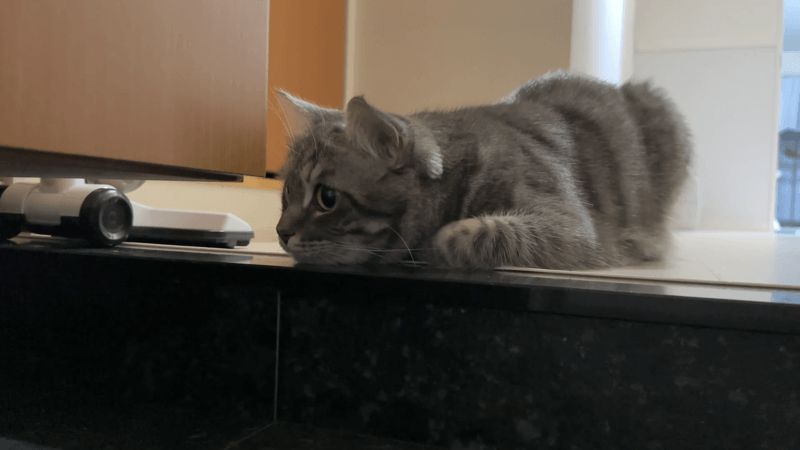
Hairballs and Gastrointestinal Upsets
Hairballs are a common issue in cats, and they can lead to gastrointestinal upsets. Here’s how you can manage them:
- Regular Brushing: Brush your cat regularly to reduce the amount of loose hair they ingest during grooming.
- Special Cat Food: Some cat foods are formulated to help reduce hairball formation. These typically contain added fiber or ingredients that promote hairball passage.
- Cat Laxatives: If your cat is prone to hairballs, your vet may recommend a hairball remedy or laxative to help move them through the digestive system.
- Preventing Stress: Reducing stress in your cat can help minimize excessive grooming, which can lead to hairball formation.
- Hydration: Ensure your cat stays well-hydrated, as this can help with hairball digestion and passage.
Recognizing Digestive Problems
To recognize digestive issues in your cat, watch for the following signs:
- Vomiting: Occasional vomiting may not be concerning, but if it becomes frequent or contains blood, seek veterinary attention.
- Diarrhea: Loose or watery stools, especially if they persist, are a sign of digestive trouble.
- Constipation: Straining to defecate, infrequent bowel movements, or dry, hard stools can indicate constipation.
- Changes in Appetite: If your cat suddenly refuses to eat or eats significantly less, it could be a sign of a digestive problem.
- Weight Loss: Unintended weight loss is a potential red flag for a variety of digestive disorders.
- Lethargy: A cat with digestive issues might become less active and seem generally unwell.
- Changes in Behavior: Your cat may exhibit changes in behavior, such as hiding, excessive grooming, or vocalizing when experiencing discomfort.
Supporting a Healthy Cat Digestive System
Maintaining a healthy digestive system for your cat is essential for their overall well-being. Here are some tips to support a healthy cat’s digestive system:
- Opt for High-Quality Cat Food: Choose cat food with animal protein as the primary ingredient, avoiding fillers and additives.
- Ensure Adequate Hydration: Provide clean water, possibly from a cat water fountain.
- Adjust Fiber Content: Tailor fiber levels to your cat’s needs for improved digestion.
- Practice Portion Control: Avoid overfeeding by following recommended portions based on age and activity level.
- Gradual Diet Changes: Transition to new food slowly over about a week to avoid upsetting your cat’s stomach.
- Regular Vet Checkups: Routine vet visits help detect and address digestive issues.
- Minimize Stress: Create a stress-free environment and consider feline pheromone products if needed.
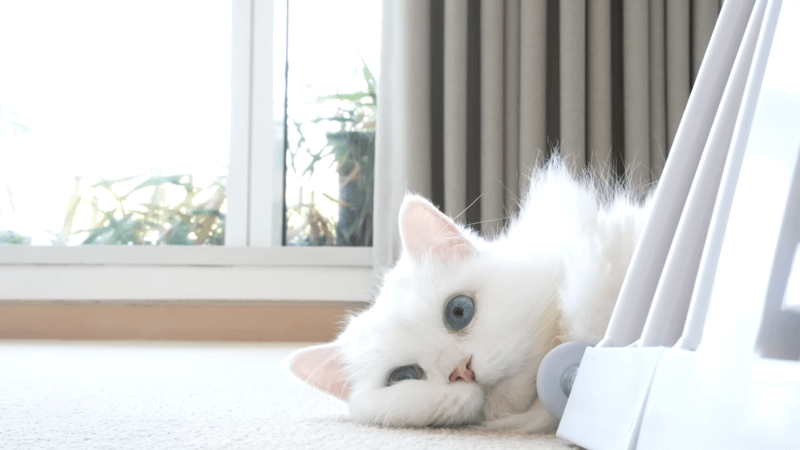
Choosing the Right Cat Food
Selecting the right cat food is crucial for your cat’s health. Here are some considerations:
- Read the ingredients: Check the ingredient list on the cat food packaging. Look for whole meat or fish as the primary ingredient, and avoid foods with excessive fillers like corn or soy.
- Consider Life Stage: Choose cat food that is appropriate for your cat’s life stage. Kittens, adults, and senior cats have different nutritional needs.
- Wet vs. Dry Food: Both wet and dry cat food have their advantages. Wet food provides more moisture and can be beneficial for cats prone to urinary issues. Dry food can help maintain dental health.
- Avoid allergens: If your cat has food sensitivities or allergies, select food that doesn’t contain the problematic ingredients.
- Consult Your Veterinarian: If you’re unsure about the best food for your cat, consult your veterinarian. They can recommend a diet tailored to your cat’s specific needs.
Optimal Feeding Schedules
Establishing a consistent feeding schedule is beneficial for your cat’s digestion and overall routine. Here’s how to create an optimal feeding schedule:
- Regular Mealtimes: Cats thrive on routine, so feed them at the same times each day. Most cats do well with two meals a day, but your vet can advise on the right frequency for your cat.
- Avoid Free Feeding: Leaving food out all day can lead to overeating and obesity. Instead, offer measured portions at specific mealtimes.
- Monitor Portion Sizes: Be mindful of portion sizes. Follow the recommended serving guidelines for the specific cat food you’re using, adjusting as needed based on your cat’s age, weight, and activity level.
- Stick to the Schedule: Cats often feel more secure and relaxed when they know when to expect their meals. Consistency in feeding times can reduce stress.
- Consider Treats Sparingly: Treats should be given in moderation and not disrupt your cat’s regular meals.
Ensuring Adequate Hydration
Hydration is crucial for your cat’s health, and here’s how to ensure they stay adequately hydrated:
- Clean Water: Provide your cat with clean, fresh water at all times. Cats can be particular about the cleanliness of their water, so make sure to change it regularly.
- Multiple Water Sources: Place water bowls in various locations around your home, especially if you have a multi-story dwelling. This makes it convenient for your cat to access water.
- Consider a Cat Fountain: Many cats prefer to drink from moving water sources. Investing in a cat water fountain can encourage them to drink more.
- Wet Food: If possible, include wet cat food in your cat’s diet. It has a higher moisture content than dry kibble and can contribute to their overall hydration.
- Monitor Urination: Keep an eye on your cat’s litter box habits. Frequent urination or very concentrated urine could be signs of dehydration, so consult your vet if you notice any unusual changes.
- Flavored Ice Cubes: Some cats enjoy licking ice cubes with a bit of chicken or fish broth for extra hydration. This can be a fun and hydrating treat.
Routine Veterinary Check-Ups
Regular veterinary check-ups are a fundamental aspect of responsible cat ownership. Here’s why they’re important:
- Preventive Care: Regular check-ups allow your vet to identify and address health issues early, often before they become serious or costly to treat.
- Vaccinations: Your vet can ensure your cat is up to date on vaccinations to protect them from various diseases.
- Dental Health: Dental issues can impact a cat’s digestion and overall health. Vets can assess and address dental problems during check-ups.
- Parasite Control: Vets can recommend and administer preventive measures for parasites like fleas, ticks, and worms, which can affect your cat’s well-being.
- Tailored Advice: Vets can offer guidance on diet, exercise, and other aspects of cat care based on your cat’s specific needs.
- Monitoring Health Changes: As cats age, their health needs can change. Regular check-ups help track these changes and adapt their care accordingly.
- Emergency Preparedness: Establishing a relationship with a vet means you’ll have a trusted resource in case of emergencies or sudden health issues.
Conclusion
When addressing the question “How Long Does It Take for a Cat to Digest Food?” we’ve learned that cats typically take 12 to 16 hours to fully digest a meal. However, it’s essential to consider various factors, such as age, diet, and health. To ensure a healthy digestive system for your cat, choosing the right food, maintaining proper hydration, adhering to a consistent feeding schedule, and seeking regular veterinary check-ups are key. By recognizing and addressing common digestive issues promptly, you can help your feline companion lead a happy and healthy life.
I am Nelson Cooper, I pursue my passion for writing and my belief is that cats love humans. I enjoy traveling and have a deep appreciation for the beauty of nature, as well as a soft spot for animals, particularly cats.

